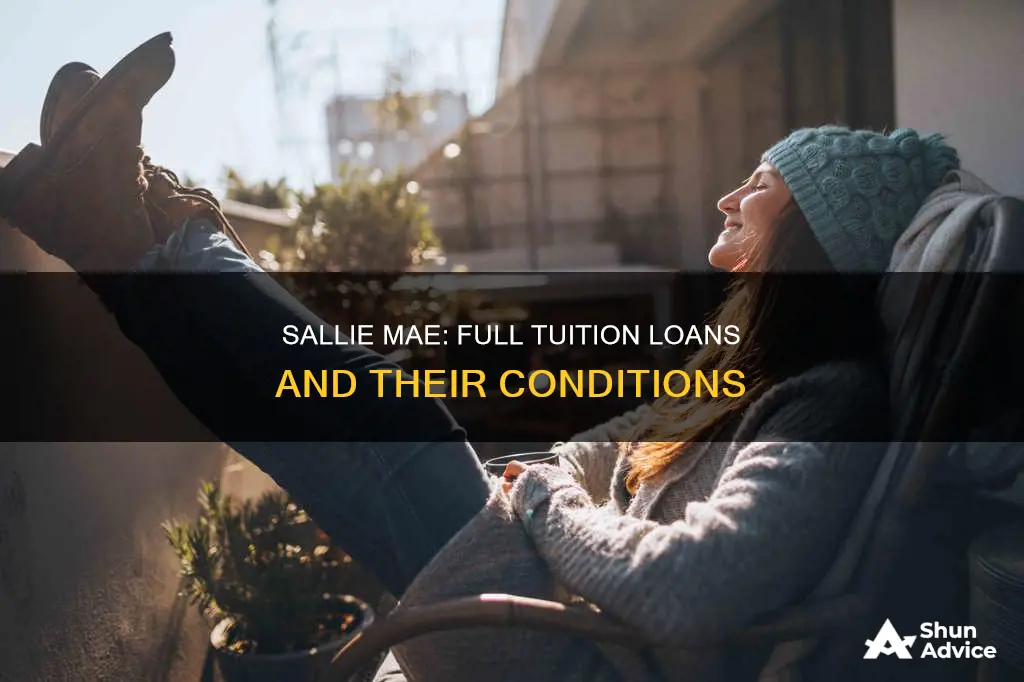
Sallie Mae is a private lender that offers undergraduate, graduate, and professional student loans. It does not offer parent or spousal loans, or student loans for DACA recipients. The company was established in 1972 by the US government as a secondary market for federal student loans and became a private student loan lender in 2004. Sallie Mae loans can help cover up to 100% of college or graduate school costs, including tuition and fees, books, supplies, room and board, meal plans, and other expenses. The company offers various repayment options, including deferred repayment, fixed repayment, and interest repayment plans. Federal loans are generally available to students regardless of income, while private loans from Sallie Mae are credit-based and require a credit check.
| Characteristics | Values |
|---|---|
| Loan provider | Sallie Mae Bank |
| Loan type | Private |
| Loan purpose | Undergraduate, graduate, and professional student loans |
| Loan range | Not disclosed |
| Interest rate | Variable and fixed |
| Repayment options | Deferred repayment, fixed repayment, interest repayment, graduated repayment period, forbearance |
| Co-signer | Allowed |
| Origination or application fees | None |
| Credit check | Required |
| Loan tenure | Up to 100% of school-certified costs for the entire year |
| Loan disbursement | Up to 12 months |
What You'll Learn

Sallie Mae loans can cover up to 100% of college costs
Sallie Mae is a private lender that offers undergraduate, graduate, and professional student loans. The company was established in 1972 by the US government and became a private student loan lender in 2004. Sallie Mae student loans can help cover up to 100% of college or graduate school costs. This includes tuition and housing fees, as well as smaller expenses like books and a laptop.
Sallie Mae offers different types of student loans, including undergraduate, graduate, and professional loans. They also provide technical school loans with competitive rates. The company offers several repayment options for their loans, including deferred repayment, fixed repayment, and interest repayment. With deferred repayment, borrowers make no payments while in school and during the grace period, but interest accrues and is added to the loan principal balance at the end of that period. Fixed repayment allows borrowers to make monthly payments of $25 while in school and during the grace period, with any unpaid interest added to the loan principal. The interest repayment option involves making interest-only payments each month while in school and during the grace period.
Sallie Mae also offers private student loans that are credit-based, meaning they will check the borrower's credit rating and other information. For borrowers with little or no credit history, applying with a creditworthy cosigner may increase their chances of approval and help them get a better interest rate. The company recommends that borrowers evaluate all anticipated monthly loan payments and expected future earnings before considering a private student loan.
In addition to tuition and fees, Sallie Mae loans can also be used for other school-related expenses. After the loan has been disbursed to the school and tuition, room and board, meal plans, and other fees have been deducted, any remaining funds will be given to the borrower. This leftover money can be used for any eligible school expenses. However, it is important to remember that it is still student loan money and will need to be paid back with interest.
How Realtors Can Help Secure Your Dream Home Loan
You may want to see also

Private student loans are credit-based
Federal loans are provided by the government, while private loans are taken out from a bank, like Sallie Mae, or a credit union. Federal loans are available to students regardless of income and do not require a credit check or cosigner. Private student loan rates tend to be higher than federal loan rates, but not by a large amount.
Sallie Mae offers student loans for undergraduate and graduate students, as well as those studying for the bar exam or relocating for medical and dental residencies. Their loans can help cover up to 100% of college or graduate school costs.
Before applying for a private student loan, it is recommended that you first fill out the Free Application for Federal Student Aid (FAFSA) to see what financial aid you may be eligible for. You should also use tools like Finaid's Loan Payment Calculator to understand what your repayment will look like after graduation. This will help you make an informed decision on how much to borrow and how interest rates will impact your repayment.
When choosing a private student loan, you should research your options and compare interest rates, fees, repayment options, eligibility requirements, and other factors that are important to you.
Principal Retirement: 401k Loans and Their Impact
You may want to see also

Sallie Mae offers three repayment options
Sallie Mae offers loans to students in undergraduate, graduate, certificate, dental, medical, and health professions programs. It also offers loans to graduates studying for the bar exam or relocating for medical and dental residencies. These loans can help cover up to 100% of college or graduate school costs.
- Deferred repayment: Students make no payments while they're in school and during the six-month grace period after graduation. However, interest accrues during this period and will be added to the loan principal balance at the end.
- Fixed repayment: Students pay a fixed amount, usually $25, every month they're in school and during the six-month grace period. Any interest that's unpaid will be added to the loan principal balance. This option results in lower overall loan costs than the deferred repayment option.
- Interest repayment: Students make interest-only payments each month while in school and during the six-month grace period.
Sallie Mae also offers several options for delinquent customers. These include loan modification, which lowers monthly payments by reducing the interest rate and possibly extending the loan term, and payment extension, which allows customers to bring their loan current by making payments equal to or greater than the current amount due for three consecutive months.
Refinancing Student Loans: Costs and Benefits Explained
You may want to see also

Federal student loans don't require payments during school
Federal student loans are provided by the government, while private loans are taken out from banks like Sallie Mae. Federal loans are generally available to students regardless of income and don't require a credit check. Private loans, on the other hand, are credit-based, meaning the lender will check your credit rating and borrowing history.
For many students, deferring payments during school is a sensible option, especially if their income is limited. However, it's important to consider the impact of not making any payments during school. While it can help keep costs manageable in the short term, it will likely increase future monthly payments and the total amount repaid.
Private student loans from lenders like Sallie Mae may also offer in-school payment deferral, but interest typically accrues during this time and is added to the loan balance if unpaid. Private lenders also offer different interest rates and repayment options.
Sallie Mae offers private student loans that can cover up to 100% of the cost of attendance for undergraduate and graduate students, with no minimum enrollment requirement. These loans are subject to credit approval, identity verification, signed loan documents, and school certification.
RD Rehab Loans: What You Need to Know
You may want to see also

Sallie Mae loans are made by Sallie Mae Bank
Sallie Mae Bank is a publicly traded U.S. corporation that provides consumer banking and private student loans. It was originally established in 1972 as the Student Loan Marketing Association, a government-sponsored enterprise that serviced federal education loans.
Sallie Mae loans are available to students studying online or on campus and can help cover up to 100% of college or graduate school costs. The company encourages students and families to start with savings, grants, scholarships, and federal student loans before considering a private student loan. For private student loans, the lender will check the borrower's creditworthiness, including their borrowing and repayment history. Many federal loans do not require a credit check.
Sallie Mae offers competitive rates on its loans, and borrowers can receive a 0.25% rate discount on their undergraduate loans for setting up autopay. The company also provides fixed and deferred repayment options, where interest is charged starting when funds are sent to the school. With these options, the interest rate is higher than with the interest repayment option, and unpaid interest is added to the loan's current principal at the end of the grace/separation period.
Sallie Mae also offers a multi-year advantage, allowing students to get the money they need year after year. The company recommends that students apply for a student loan once to get funding for the entire year so they can focus on their studies.
Sail Loans: Uncovering the Truth About Universal Approval
You may want to see also
Frequently asked questions
Sallie Mae offers student loans that can cover up to 100% of college or graduate school costs. The loan covers tuition and fees, books, supplies, and room and board.
Sallie Mae offers three repayment options for its undergraduate borrowers: Deferred repayment, Fixed repayment, and Interest repayment. With Deferred repayment, borrowers make no payments while in school and during the grace period after graduation, but interest accrues and is added to the loan principal balance at the end of that period. Fixed repayment allows borrowers to make $25 payments each month while in school and during the grace period, with any unpaid interest added to the loan principal balance. Interest repayment allows borrowers to make interest-only payments each month while in school and during the grace period.
Yes, Sallie Mae loans can also be used for room and board, meal plans, and other fees. If there is any leftover loan amount after covering these expenses, the borrower will receive the remainder as a check or debit card. It is recommended to use this money for eligible school expenses or to send it back to the student loan servicer to reduce the total loan cost.
For private student loans, Sallie Mae will check the borrower's credit rating and other information. This includes the borrower's history of borrowing money and repaying it on time. If the borrower does not have a strong credit history, they may need a creditworthy cosigner, such as a parent or relative, to increase their chances of approval and potentially get a better interest rate.







